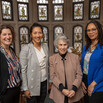New Law School Workshop Explores Impact of COVID Across All Aspects of Law and Policy

Each week during the Fall 2020 semester, leading experts from law, policy, economics, health, and governance have convened at an interdisciplinary workshop at Yale Law School to address cutting-edge issues related to all aspects of the COVID-19 pandemic.
Led by Abbe R. Gluck ’00, Professor of Law and Faculty Director of the Solomon Center for Health Law and Policy at Yale Law School, and William K. Townsend Professor of Law Ian Ayres ’86, the 14-week workshop combines an innovative seminar format for students with talks from scholars, industry leaders, scientists, advocates, economists, and government experts. Topics range from the impact of the pandemic on vulnerable populations — such as the elderly, the incarcerated, and the disabled — to the role of FDA and health policy in addressing the pandemic, federalism and the presidency, the economy, the election, constitutional law, the workplace, disparities, education, and more. The workshop, open to the public, has already drawn hundreds of attendees from across the University and far beyond, and runs Wednesday evenings through the end of November. Videos of prior workshops, and other content, are also available on the Solomon Center website.
“The interest has been overwhelming,” Gluck said. “The range of the workshop and the incredible engagement from students, colleagues, and the public each week illustrate so vividly how COVID has affected every aspect of our lives.” The idea for the workshop gelled in Spring 2020, after Gluck, together with Professor David Schleicher, ran a series of faculty workshops engaging with legal issues as they emerged during the height of the pandemic. The level of interest pointed to the benefit of something more comprehensive. Gluck and Ayres have a history of collaborating on interdisciplinary academic courses relating to pressing issues, including their 2018 collaboration on Law and the Opioid Crisis, with Professor Kate Stith, and their 2020 collaboration on Law and Gun Violence, with Professor Tracey Meares. Like those earlier efforts, the COVID workshop is already producing new scholarly articles, podcasts, and published student work.
The workshops have featured the nation’s leading experts and officials. For example, the session on incarcerated populations featured retired United States District Judge Nancy Gertner ’71; the FDA session featured Dr. Margaret (Peggy) Hamburg, former Commissioner of the Food and Drug Administration, and Professor Nathan Grubaugh, Assistant Professor of Epidemiology at Yale School of Medicine and one of the developers of the rapid saliva-based COVID test being used by the National Basketball Association. In the workshop on health care systems, Andy Slavitt brought his perspective as former Acting Administrator of the Centers for Medicare and Medicaid Services to address the federal government’s health policy response, while Dr. Mandy Cohen, Secretary of the North Carolina Department of Health and Human Services, discussed the state level public health responses to the pandemic and the political and legal challenges to enforcing the responses. Leading law scholars including Yale Law School’s own Judith Resnik, Marisol Orihuela ’08, Daniel Markovits ’00, and David Schleicher have also shared their expertise.
Upcoming workshops will continue to feature the top experts on a variety of important topics. On October 28, for the session on COVID and the courts, Judge Robert A. Katzmann ’80, who until last month was Chief Judge of the U.S. Court of Appeals for the Second Circuit, will be joined by Chief Judge Lee H. Rosenthal, Chief Judge of the U.S. District Court for the Southern District of Texas, and Chief Justice Bridget Mary McCormack, Chief Justice of the Michigan Supreme Court. Award-winning economist Daron Acemoglu will be speaking on November 4 about lockdown models to stop the spread of COVID-19, and Nicholas A. Christakis, Sol Goldman Family Professor of Social and Natural Science, Departments of Sociology; Ecology & Evolutionary Biology; Biomedical Engineering; and Medicine at Yale University, will be presenting his forthcoming book, Apollo's Arrow: The Profound and Enduring Impact of Coronavirus on the Way We Live, on November 16. On November 18, the workshop will be dedicated to the topic of disparities in the pandemic and will feature Dr. Eliseo Pérez-Stable, Director of the National Institute on Minority Health and Health Disparities. Yale Law Professor John Fabian Witt ’99 will address Executive Powers, Emergency Powers & Civil Liberties on October 21 and Professor Yair Listokin ’05 will address COVID and the economy on November 4.
“One theme that has emerged from nearly every session is how COVID highlights salient gaps, inequities, and trends in our legal system that were not readily apparent before while accelerating how we address them,” said Gluck. “Whether we're talking about mail-in ballots, prison health, the plight of cities, telemedicine, or disparities in health care — all those issues were there before COVID. But COVID has made them impossible to ignore.”
The Solomon Center has been working on a number of important projects since the start of the pandemic, including developing federal legislation; easing restrictions on telehealth and expanding health care access to students now home from universities; opposing executive orders that have restricted access to abortion during the pandemic; and advocating for improving prison health. The Center is also partnering with Harvard Law School’s Petrie-Flom Center for Health Law Policy, Biotechnology, and Bioethics on a COVID-19 book project.
For more information on the workshop and ongoing COVID-19 scholarship, visit the Solomon Center COVID-19 webpage. CLE credit is also available for workshop attendees with prior registration.


